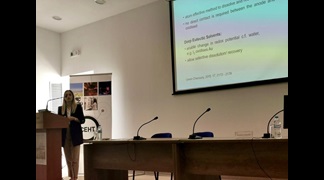Centre for Sustainable Materials Processing
Material Centre at the 28th EUCHEM conference on Molten Salts & Ionic Liquids, in Greece, June 2022
 The 1st year PhD students, Evangelia Daskalopoulou, attended and presented at the 28th EUCHEM conference on Molten Salts and Ionic Liquids last week in Greece!
The 1st year PhD students, Evangelia Daskalopoulou, attended and presented at the 28th EUCHEM conference on Molten Salts and Ionic Liquids last week in Greece!
According to Evangelia:
"My presentation at the 28th EUCHEM conference was about the redox potentials in Deep Eutectic Solvents (DESs). One of the main problems that modern technology is facing right now is the constant increase of the overall electronic waste. Therefore, it is highly important to suggest innovative and environmentally benign ways for the recycling and the recovery of metals".
Evangelia is currently working on electro-catalysis, which is considered as an alternative method and can be optimized using oxidizing agents, which can be regenerated with the presence of oxygen in Deep Eutectic Solvents. This method has proven to be efficient and is based on the use of low-cost chemicals and more friendly to the environment than mineral acids and common Ionic Liquids.
Her study focused on the investigation of the redox properties in two DESs: CaCl2.6H2O: EG (CaDES) and ChCl: EG 1: 2 (Ethaline). At first, she compared the redox potentials of different oxidizing agents in CaDES with the corresponding values in Ethaline, as well as the redox potentials in Ethaline with the corresponding aqueous values. In overall, the redox potentials can be controlled by the speciation in the solution. She also investigated the electrochemistry of different copper salts in CaDES and in Ethaline, of copper chloride in different Ionic Liquids and of iron chloride in a range of different DESs.
Evangelia stated that "we aim to find out the effect of the different salt anion of the different solvent anions, as well as of the speciation differences on the redox potentials. The effect of the solvent anion seems to be much more remarkable than the effect of the salt anion on the redox potentials. Moreover, the differences in the speciation can be used to modify the redox potentials and tune the strength of the oxidizing agent".
Her presentation also included the recycling of Printed Circuit Boards as they are considered as an attractive resource for metal recovery. Evangelia add "I focused on the etching of copper from PCBs, using copper chloride and iron chloride as an oxidizing agent in the calcium chloride system. Copper can be etched much faster in the case of using copper chloride, while both oxidizing agents can be regenerated by reacting with the presence of the surrounding air". She also highlighted the utilisation of ultrasound to enhance etching rates, as the results were much more effective.
At the end of her presentation, Evangelia concluded that metal can be selectively etched in the presence of a catalysts in DESs, which can be auto-regenerated, from different metal structures.